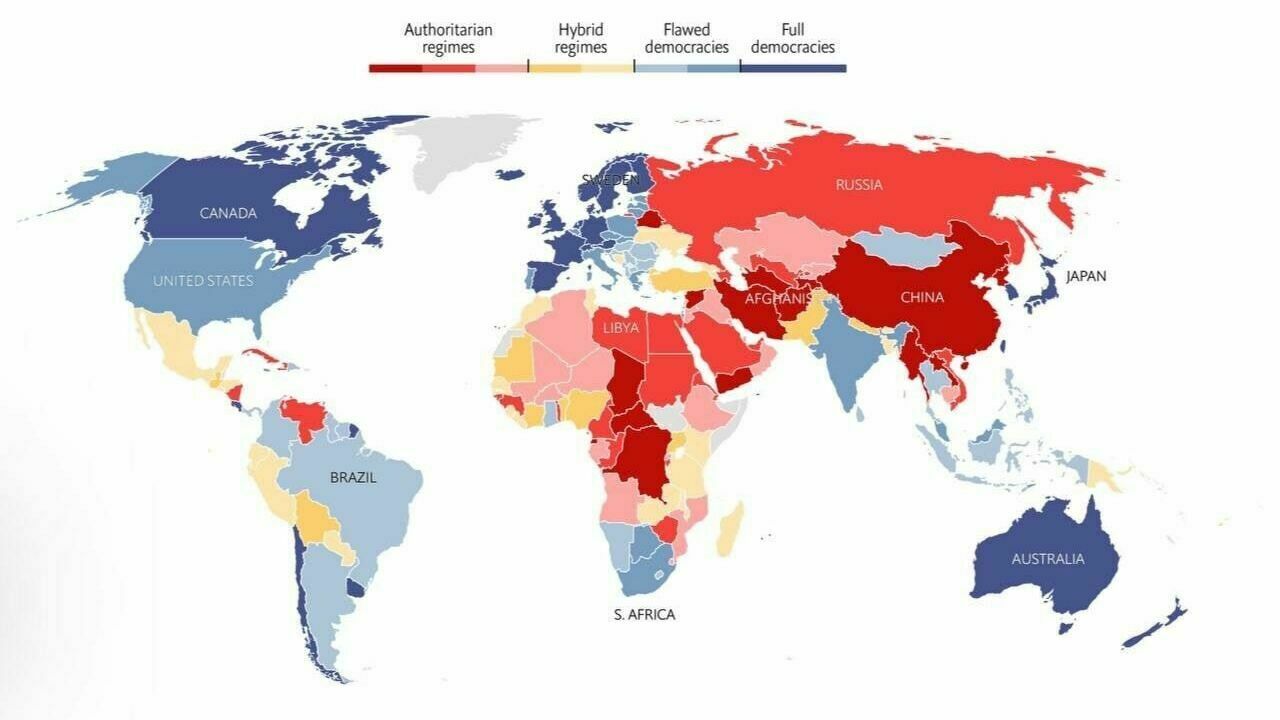Posted 3 февраля 2023, 11:20
Published 3 февраля 2023, 11:20
Modified 3 февраля 2023, 11:26
Updated 3 февраля 2023, 11:26

Russia is at the bottom. In the new rating of "Global Democracy" our country took the 146th place
The Economist magazine has published an annual ranking of EIU countries by the level of democracy development.
At the top of the list: Norway, Sweden, Finland, New Zealand, Denmark, Iceland, Ireland and Switzerland. Ukraine is ranked 87th in it, and Russia is on the 146th.
At the same time, The Economist reminds that in 2022 the protracted decline of world democracy has stopped. The annual study assesses the state of democracy in 167 countries based on five indicators: the electoral process and pluralism, the functioning of government, political participation, democratic political culture and civil liberties. Each indicator is evaluated on a scale of up to ten points.
According to the latest edition, almost half (45.3%) of the world's population lives in some kind of democracy, while more than a third (36.9%) live under authoritarian rule (see map). The global indicator of 5.29 out of ten, which is only 0.01 more than in the previous year, is a stagnation of the process, and not a reversal from the fading of democracy that began in 2016, which was expected.
One of the reasons why the trend was expected to change was the lifting of pandemic-related restrictions in 2022. The widespread suppression of individual freedoms, originally designed to protect people from COVID-19, led to a decrease in indicators in 2020 and 2021. But any improvements in 2022 were negated by negative events in other countries. Moreover, China, where almost a fifth of the world's population lives, only in December ended the policy of "zero morbidity", locking up tens of millions of its citizens for many months. The government abandoned the "zero morbidity" policy after widespread protests against it. However, the repressive reaction of the state to these protests contributed to a decrease in the assessment of democracy in China to 1.94 points out of ten, which is the lowest since 2006, the year the rating was compiled.




The polarization of society remains the biggest threat to democracy in America, although historically high turnout in the midterm elections in November and widespread rejection of candidates who still deny the results of the 2020 presidential election helped the country maintain a rating of 7.85.
As for other countries, for example, as a result of numerous coups, Burkina Faso dropped by 16 positions. Failed coup attempts in Guinea-Bissau, Sao Tome and Principe, and the Gambia contributed to the stagnation in the ranking of democracy in sub-Saharan Africa for the second year in a row.
But eight of the ten countries that occupy the first places in the index are located in Western Europe. Thus, Western Europe became the only region where a noticeable improvement in the situation was registered in 2022. Its regional indicators have returned to the level that existed before the pandemic. Norway has maintained its long-standing position at the top of the ranking, followed by four other Scandinavian countries. (New Zealand took second place in the global ranking). Turkey, the only "hybrid regime" in the region, has seen a sharp decline in democracy over the past decade, reflecting the autocratic rule of Recep Erdogan. This summer, the country will hold decisive elections that can determine its democratic status.
Despite some global improvements, democracy around the world remains under threat, experts believe.
It is curious that Ukraine, which took 87th place, also passes the compilers in the category of "hybrid regimes". Moreover, a year ago she occupied the same position and in the same category.
But Russia is not standing still and is confidently and famously moving to the very bottom of the "authoritarian regimes" category, having dropped 22 positions in a year from 124 places to 146th (a record rate of decline, the compilers say). Now it is balancing somewhere between Cuba and Libya, having hopelessly overtaken such well-known regimes in this sense as Zimbabwe and Cambodia in authoritarianism.
The compilers of the rating comment on the situation in our country as follows:
"The regime's ambitions to restore Russia's position as an imperial power cause fierce resistance from the West, but condemnation from non-Western countries is not so obvious. About two-thirds of people live in countries whose governments are either neutral or positive towards Russia.
The Russian propaganda machine is trying to convince these countries that the goal of the West is to "divide and destroy" Russia. In Russia itself, the state's tight control over the media and the suppression of protests against its own led to the fact that it received a record low score of 2.28..."